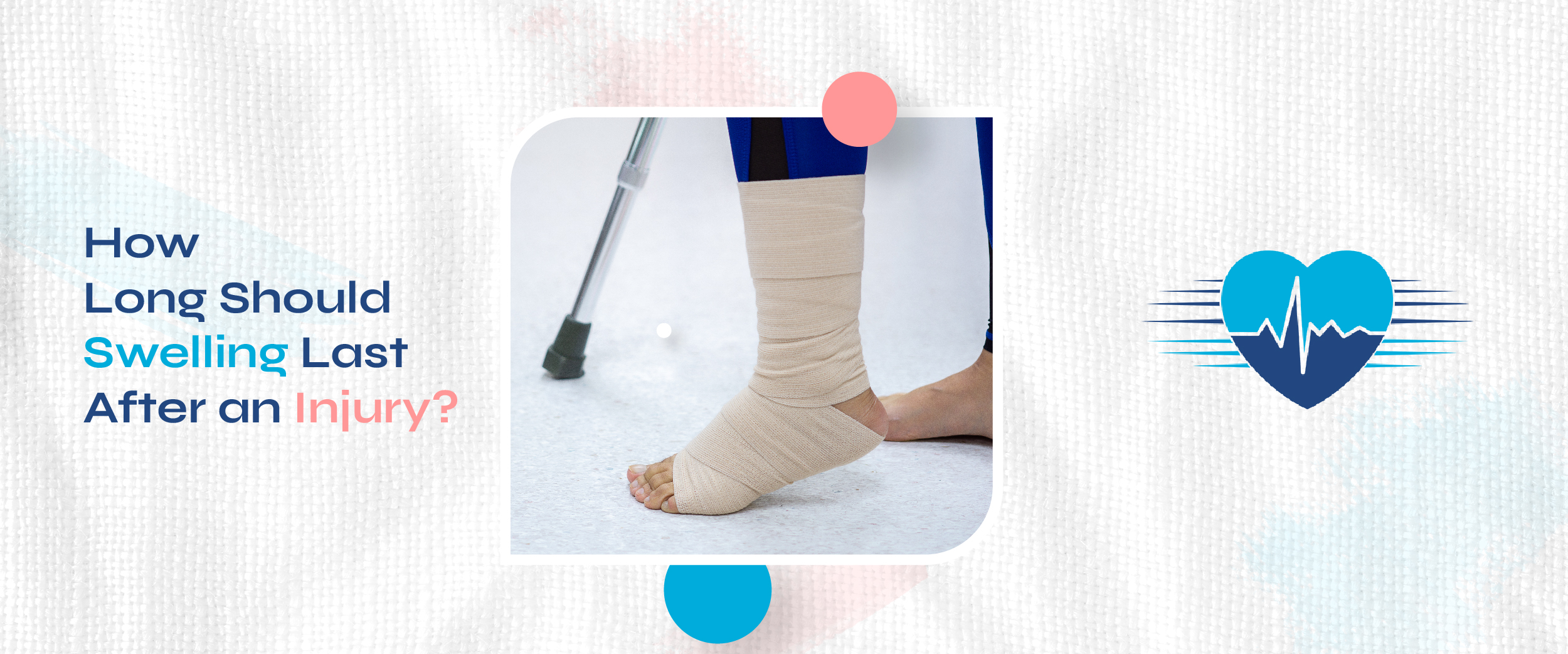Everyone gets hurt sometimes a simple bump, a fall, or something more serious like surgery. Your body often reacts by swelling up. But how long should swelling last after an injury? Knowing this can help you heal more smoothly.
Let’s discuss swelling. We’ll cover its duration, causes, and when to see a doctor. We won’t miss out on special situations, like a swollen hand after punching wall, or in events such as surgical procedures or trauma.
Today Telemedicine provides expert care for injuries and urgent health issues. You can rely on us for reliable advice and personalized support anytime. Contact us today.
What Is Swelling and Why Does It Happen?
When you’re injured, your body swells. This is its way of healing. It sends more blood and fluids to the injured area. The added blood flow shields the damaged area and aids in recovery. Though, it’s also the reason for the swell or bloat we usually notice.
Ever asked yourself, “Why do we swell when injured?” The body’s healing process is the key. It sends extra fluids. They are rich in infection-fighting white cells and nutrients for tissue repair. Without this swelling, figuring out and fixing damaged spots would be tough for your body.
However, swelling is needed, but it can also get too much or stick around more than it should. This can make one uncomfortable and worried about getting better.
How Long Should Swelling Last After an Injury?
So, how long should swelling last after an injury? It’s not the same for all. Minor injuries usually peak in swelling in one or two days. Then, the swelling slowly reduces. But, for serious issues like fractures or post-surgery, it could take weeks for the swelling to go down.
For instance, if you have a swollen hand after punching wall, your hand may swell. This could last a few days or a week, all based on how hard you hit.
On the flip side, swelling after trauma, like a twisted ankle, might stick around. It could take a few weeks to heal if the damage isn’t treated properly.
Factors That Affect Swelling Duration
How long a swelling lasts after an injury is impacted by many things? This might be the force and kind of injury, how well your body heals, and your lifestyle choices.
Severity and Type of Injury
How long the swelling lasts can be highly dependent on the seriousness and type of injury. With mild injuries, like a small sprain or bruise, swelling might last only a few days. In contrast, tougher injuries, like broken bones, can keep swelling in play longer. So can ripped ligaments. Injury location matters. Muscle and joint injuries might swell up differently. Each has a unique recovery schedule.
Whole body swelling after surgery is not uncommon. How long it lasts can range from a few weeks. It depends on how complex the procedure is and how your body heals.
Do you see continuous swelling? Are you questioning, why is my hand still swollen after surgery? Perhaps it’s time to reach out to your health specialist.
Individual Healing Capabilities
Recovery speeds differ among people. Age, health, and genetics influence the speed of your recovery process. When we get older, healing usually takes more time, causing swelling duration to grow. Younger people may heal faster, resulting in a quicker reduction of swelling.
Your overall well-being matters too. A person who eats well and exercises may recover faster than one with health issues or bad habits.
Lifestyle Factors
Choices you make in life can make healing fast or slow. For example, eating foods full of protein and vitamins makes you heal faster. But, bad habits like smoking or drinking too much alcohol can make swelling stay longer. Stress also plays a role. If you’re super stressed out, your body’s defense system gets weak. This can slow down healing and make swelling last more.
Are you healing from surgery or a serious injury? Cutting down on salt could help with fluid retention. This might help dial down swelling. It’s important to rest plenty and stick to what your doctor says. That’s how you’ll handle swelling best.
Managing Swelling at Home
Managing swelling at home can help speed up recovery. Here are some practical tips:
- Ice Therapy: To lessen swelling areas, place a cloth-covered ice pack on the wound. Try this every hour for about 15-20 minutes, but only for the initial 48 hours post-injury. Never put ice straight onto your skin to stop frostbite.
- Compression: Wrapping the injured spot with a bandage can lessen swelling. It also provides needed aid to the affected area. Make sure the bandage is snug but not too tight. Too much pressure can cut off blood flow.
- Elevation: By lifting your injured area higher than your heart, swelling can lessen. This happens as fluids move away from the injured area.
- Rest: Letting your body recover is key. Try not to strain the injured area until the swelling has calmed down.
When to Seek Medical Help?
Most swelling is normal as our bodies heal, but sometimes we need a doctor’s help. Here’s when you should look for medical attention:
- The swelling is severe, sudden, or it is getting worse.
- The swollen area is red, warm, or painful.
- You have a fever or notice pus. It could mean an infection.
- Swelling persists beyond 2-3 weeks, especially if you haven’t seen improvement.
- You experience whole body swelling after surgery or swelling after trauma that doesn’t seem to improve.
These signs might show problems or hidden issues that need expert help. Unsure? It’s always good to ask a healthcare provider if your wound is healing right.
Specific Cases – Surgery, Trauma, and Prolonged Swelling
After an operation, you often see some swelling. It sticks around longer than the swelling from minor injuries. How long should swelling last after surgery? Usually, it should go down a lot in about two or three weeks. Yet, a bit of swelling might stay for months. This depends on what kind of surgery you had and how your body fixes itself.
In severe trauma cases, the healing process can be long. Swelling often lingers. Think about what injury takes the longest to heal. Bone fractures are a good example. In elderly or sickly people, it can take months for the bones to fully heal. The swelling lasts that long, too.
Thinking why is my hand still swollen after surgery, this might mean a healing problem. A doctor’s appointment seems necessary.
Preventing Prolonged Inflammation
It’s key to let inflammation heal fully. Don’t hurry into exercise until the swelling is all gone. Long-term swelling may cause rigidity and increase the risk of hurting the area again.
Here are some ways to prevent prolonged swelling:
- Gradual Return to Activity: Start with a slow and relaxed tempo. Then, as the swelling goes down, level up your activity. This method shows your body can handle the pressure without harm.
- Follow Medical Advice: Consistently adhere to your physician’s suggestions for recovery. This could involve physical therapy, rest, or particular workouts to enhance recovery.
- Stay Hydrated: Drinking plenty of water helps flush out toxins and reduce swelling.
Conclusion
Injury often causes swelling. It’s normal and needed for healing. But knowing how long should swelling last after an injury helps you cope with your bounce-back better. How long it sticks around hinges on how bad the injury is, how quickly your body fixes itself, and your way of living. Usually, swelling is no big deal and will fix itself. But, see a doctor if you notice anything strange or if the swelling lasts too long.
Keep in mind that steady progress is vital in healing. By caring for yourself and following these tips, your body will heal. It will also reduce the risk of ongoing swelling or further damage.
FAQs
Why do we swell when injured?
When you get injured, your body responds by swelling. This happens because more blood and fluid go to the injured area. This helps guard the area and helps it heal.
How long can swelling last after an injury?
After an injury, swelling might stick around for days or even weeks. This fluctuates based on how bad the injury is and personal healing factors. If the swelling sticks around past 2-3 weeks, it’s time to seek medical advice.





